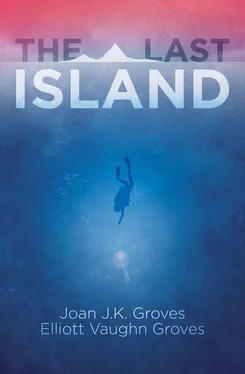There were enough stores on hand to make a comfortable and safe voyage but all the rules of reason would have to be observed in order to stay within the parameters of precaution.And thus I set out. 11°22.260 ′ N x 142°35.589 ′ E was the compass destination.
Damn the torpedoes, full steam ahead , I thought.
Admiral Farragut was correct.
One small boat versus an unending ocean, one man versus unending time was the drama. There was no fear, there was no joy, there was no gratification, there was only the job.
I kept remembering what my mother had said to me thousands and thousands of times.
“Time and tide wait for no man.”
I soon had a more refined understanding of her wisdom. Tide is the time.
I wondered on that empty surface above the full ocean base , Was my tide running out?
Why would this thought occur to me once I was at 11°22.260′ N x 142°35.589′ E?
What the—
The sun was directly overhead so there was no shadow upon the face of the sea and there were no clouds in the sky, no countenance in the air. And, this was the strangest part of it all. The sea in gradations of light goes from bright to dim to dark—from horizon to horizon or from surface to depth. But, in temperature there are warm surface waters, a thermocline demarcation line, and then cold water. The warm surface waters and the lower colder waters never integrate to produce a tepid sea.
The sea was not red, and then suddenly the sea was as red as sweet, oxygenated arterial blood. There was no gradation from pink to red; there was no red, and then there was deep red.
How many Pfiesteria Complex Organisms did it take to produce this blood-red tide since a single PCO organism contains an almost invisible red hue?
I tried to think.
There must be more PCO’s here than there are stars in the sky . It was the only answer.
What a horribly wonderful conclusion.
I was in a red pool of death. Only the fiberglass hull of my ship was between my life and my death. I could not drink, I could not swim, and I could not even reach into the red and maintain my life.
In my head, I played with the math. I knew the classical laws of Newtonian acceleration. With a little remembrance, I used the temperature, pressure, and humidity of the Ideal Gas Laws that I learned in high school to calculate the density of the air. Gas constants were always a joy to engage in as a student in Mr. Fenstermaker’s classroom. The water was so much easier. It was 1000kg/m 3. That was not the absolute truth. But, what is 3.5% in the scheme of things? 1000 was a perfect number to use.
Contemplating these absolutes, I thought about my new possession— it .
It was so very simple and that was what all the others had failed to understand. Here, very alone on the sea, I understood it. I could possess it. Or, it could possess me . And, I wanted to possess me. The fall through 35,827 feet of air was easy to calculate. The fall through 35,827 feet of ocean was incalculable. It would float. It would flutter. It would fall. It would drown in the undivided waters of the red sea.
There was no ceremony, there was no afterthought, there was no regret, and there was no prayer as I tossed it in into the deep red. I stepped back as I tossed it for I did not want any splash of blood to hit me.
It floated. It fluttered. It fell. I did have the hydrophone turned up to the maximum and the splash was explosive. The flutter was a fading swish. Then, even at maximum, there was just silence.
I ignited my engines.
As the wake expanded into that perfect “V” of divided foaming sea, I was free of it. And, the world was free of it.
11°22.260 ′ N x 142°35.589 ′ E, once the center of my wake, was now a point that had fallen off the curve of the earth. All the PCO’s had dissipated—for “disappeared” is such a poor empirical word. The engine was running most effectively as my ship skimmed along the surface for, after all, on the ship was one item less. The throbbing sounds of the boat engine and the hum of propellers was a gospel hymn to my ears.
I could push it to better than thirty knots but then I would not have enough fuel to reach the island. I reduced speed but I did not cruise. I was exhausted past the point of all need for food, water, sleep, and soap but all I wanted to do was eat, drink rest, and wash. So, maybe a little more speed could be applied.
What the—where did that swell come from?
I thought about its origin.
What the—
There was a second swell, a third, a fourth, and then some racing water beneath my boat. It caused my boat to race along at faster than its possible top-rated speed and with each swell I rode a little higher upon the ocean’s film.
The only moving air was that which I was creating by pushing through the atmosphere.
What was that sound?
It was not the efficient sound of the engines or the propellers. And it was not the sound of the sea—which I knew. The hydrophones were transmitting a low and deep sound of something angry as if a great leviathan had been wounded and was bleeding to death from a great open wound. Because it was screaming in the sea, its pain became a universal background cry of pain for the cry was vibrating each and every molecule of water in each and every direction—and the sound of its pain was out-racing my boat. Soon, the sound dimmed and faded out. The beast must have made a last cry and died.
Then I thought , I have never heard a birth cry. Maybe, it was a leviathan giving birth. I did know that PCOs cried neither in dying nor in giving birth.
I turned the hydrophone off. I turned the marine radio off. I turned the short wave and the sea phone off. In effect any device that had an on/off switch was turned off. I was electrically disconnected from the universe.
There it was, The Last Island. There it was, the outline of the top of the island. But where was the coast and what was that dark line beyond the high-water mark?
What the—Am I on the right island? Have I navigated incorrectly by dead reckoning and made landfall on another island by mistake?
I answered myself , No. You are too good for that and besides, it is the Last Island, just look.
But, there was something amiss in my muddled brain.
Had the toll of the voyage exhausted me to a state of misperception?
No , I thought.
Water always falls downhill. It is the ultimate truth. I began by following the outgoing tide and, in doing so, floated backward in time.
Those swells in the ocean were swells that reached 35,827 feet down to the floor of the sea. Those swells had out-raced me by five hundred sixty-three miles per hour. Those swells had reached the Last Island as tsunami waves and had eroded the shore away as a fisherman removes scales from his catch of the day. The debris of man and nature were simply piled up as so much junk at the inner-most places where the wave is removed of its last energy. The incoming tide had in effect raised the sea depths to the surface in a series of rising waves and, as water always falls downhill, the sea bottom and the sea wave fell upon the island. And, in doing so, scoured it to the island’s coral base.
A goldfish bowl had been knocked to the floor and the goldfish were flopping, fighting, and dying in fright. That is what I saw as I navigated without a wake through the floating debris field that had once been the Last Island.
The Last Island was largely decimated, but not destroyed.
Читать дальше












